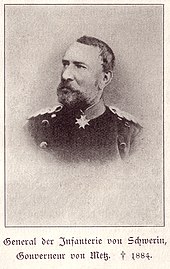Kurt von Schwerin (General)
Kurt Ludwig Adalbert von Schwerin (born April 4, 1817 in Königs Wusterhausen , † April 13, 1884 in Metz ) was a Prussian infantry general and governor of the Metz fortress .
Life
origin
Kurt was a son of the Prussian captain a. D. Karl von Schwerin (1770–1829) and his wife Mathilde, née von Falcken-Plachecka (1788–1846).
Military career
Schwerin initially retired from a country preacher and visited the cadet houses in Potsdam and Berlin . During his training in Berlin from September 1833 he was the Leibpage of King Friedrich Wilhelm III. before Schwerin was transferred to the 2nd Guards Regiment on foot in the Prussian Army on August 14, 1834 . He was promoted to regimental adjutant in 1844, took part in the suppression of the barricade uprising in Berlin in 1848 and advanced to prime lieutenant in mid-November 1848 . After Communion Andie conclusions as adjutant to the 1st and 2nd Guard Landwehr Brigade Schwerin was as a captain in November 1853 Chief of the 6th Company. When he was promoted to major on July 25, 1857, he was transferred to the General Staff of the 2nd Division in Danzig . On May 8, 1860, he was commanded to lead a battalion in the 14th Combined Infantry Regiment and appointed Schwerin, with the budgeting of the unit, as commander of the 1st battalion in Kolberg . In this position he rose to lieutenant colonel in mid-October 1861 and was promoted to colonel on June 25, 1864 as commander of the 2nd Thuringian Infantry Regiment No. 32 in Mainz . In 1866, Schwerin led his regiment during the German War in the Main Campaign in the battles near Hammelburg , Werbach , Helmstadt and Roßbrunn . After Major General von Schachtmeyer's loss due to injury , he had meanwhile also taken over the leadership of his brigade . For his work he was awarded the Order of the Red Eagle III. Excellent with swords. In 1866 Schwerin moved his regiment to the new garrison in Meiningen .
After Schwerin in January 1868, the Commander of the Order of Philip the Magnanimous had received, he was on 22 March 1868 was promoted to major general commander of the 10th Infantry Brigade in Frankfurt (Oder) appointed. With this large association he took part in the battles at Vionville , Gravelotte , Beaune-la-Rolande , Orléans and Le Mans , the battle at Parigné and the siege of Metz in 1870/71 during the war against France . For a short time he led from October 28 to November 23, 1870 for the sick lieutenant general von Stülpnagel his 5th division .
Awarded both classes of the Iron Cross and the order of Pour le Mérite , Schwerin was promoted to lieutenant general on August 18, 1871 after the peace treaty and appointed commander of the 6th division , which was part of the occupation army in France . His headquarters were initially in Reims , later in Bar-le-Duc . At the beginning of August 1873 Schwerin led his division back to the garrison in Brandenburg an der Havel . With his appointment as governor of Metz on November 19, 1876, he gave the division to his successor von Manteuffel. In May of the following year, Schwerin received the star of the Commandery of the Royal House Order of Hohenzollern and in September 1879 was also appointed Canon of Brandenburg in recognition of his service . He was promoted to General of the Infantry on September 18, 1880 and was awarded the Grand Cross of the Red Eagle Order with Oak Leaves and Swords on the Ring in January 1882 on the occasion of the festival of the Order . Schwerin died of a stroke on April 13, 1884 while working in Metz .
family
Schwerin married Auguste Itzcken (1820–1908), daughter of the businessman Karl August Itzcken, in Berlin on October 27, 1841 . The three children Elsbeth Johanna (* 1842), Kurt (1843–1876) and Katharina Sophie (* 1845) resulted from the marriage.
literature
- Kurt von Priesdorff : Soldier leadership . Volume 7, Hanseatische Verlagsanstalt Hamburg, undated [Hamburg], undated [1939], DNB 367632829 , pp. 506-507, no. 2444.
- L. [udwig] Gollmert, Wilhelm Count of Schwerin, Leonhard Count of Schwerin: History of the family of Schwerin. Part 2: Biographical News. Wilhelm Gronau, Berlin 1878, pp. 53–54.
Individual evidence
- ^ [Werner] von Bock: list of the officers' corps of the 2nd Guards Regiment on foot. June 19, 1813– May 15, 1913. Verlag R. Eisenschmidt, Berlin 1913, p. 156.
| personal data | |
|---|---|
| SURNAME | Schwerin, Kurt von |
| ALTERNATIVE NAMES | Schwerin, Kurt Ludwig Adalbert von (full name); Schwerin, Karl Ludwig Adalbert (after Priesdorff) |
| BRIEF DESCRIPTION | Prussian general of the infantry |
| DATE OF BIRTH | April 4, 1817 |
| PLACE OF BIRTH | King Wusterhausen |
| DATE OF DEATH | April 13, 1884 |
| Place of death | Metz |
